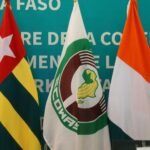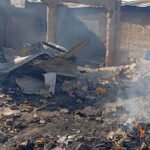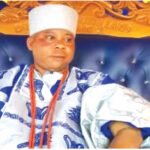Saving Anioma: Looming Blood-Bath If Land Grab Not Addressed – Jibunoh
For over four decades, Dr. Newton Jibunoh, an environmental advocate and founder of the Fight Against Desert Encroachment (FADE), has been a relentless voice for the Anioma people and their land. Known for his bold predictions and fearless activism, Dr. Jibunoh’s passion for Anioma goes beyond its rich soils and vibrant culture, it’s a battle for survival against powerful cartels, land grabbers, and corrupt systems threatening to dismantle the very essence of this community. Even amid threats to his life, Jibunoh remains undeterred, urging his people to resist short-term gains and fight for the land that defines their identity. In this interview with The Pointer, he opens up about the deep-seated crisis facing Anioma, issuing a clarion call to its people to stand firm and protect their heritage before it’s lost forever.
You’ve been a voice for the Anioma people and their lands for decades. What makes Anioma land so unique, and why are you so passionate about protecting it?
Anioma is more than just land; it’s a heritage, a symbol of who we are. I’ve traveled the world, and nowhere have I seen land as rich, fertile, and welcoming as Anioma. Our soil has fed us for generations without the need for artificial supplements, thanks to our indigenous land management and shifting cultivation practices. This land, along with our vibrant culture, the Akwaocha traditional attire, and the unique dances defines our identity. We are peaceful and welcoming people, Over 90% of the communities are farmers and the reasonable food basket of the community is coming from Anioma. The diligence of the farmers brings about so much produce from the lands. This has led to great harvest mainly in Anioma state. Mainly we harvest yam, vegetables, tomatoes, pepper, okra and so much more.
You’ve made some bold predictions about Anioma, and not for the first time. Why do you foresee a looming crisis?
I’ve been making predictions about land management and political rascality for over 40 years, and unfortunately, most of them have come true. Anioma is a beautiful land, unparalleled in its vibrancy and resources. We’re blessed with rich soils, and a welcoming nature, and our cultural festivals, like those organized by The Office of Foreign Assets Control (OFAAC), showcase our unity and pride. But the activities of land grabbers sponsored by powerful cartels are changing everything. They come with forged documents, deceiving our elders and taking what is ours. These land grabbers are buying land cheaply from our communities and selling it for millions without any development plans. They even employ cult members to secure the lands, planting them like weeds across communities from Ogwashi-Uku to Issele-Uku and beyond. These mercenaries now control our lands, and that is tearing the very fabric of Anioma society and fueling this looming bloodbath.
You mentioned the involvement of a powerful cartel and their hired cult members. Can you tell us more about their tactics and the extent of their influence?
They carried with them forged powers of attorney, bearing the thumbprints of ignorant elders in their 90s. As of now, there are dozens of court cases scattered across Anioma State, and recently, a prominent chief was killed in his town in Akwukwu-Igbo. He wanted to fight for his land that was forcefully taken by the land grabbers, which ultimately led to his death.
Recently, the Divisional Police Officer (DPO) invited the elders of the community, the land grabbers, some affected farmers, and myself to deliberate. The communities are divided. At the heated town hall meeting with police, land grabbers, and affected farmers, I had to go on my knees, begging for peace something that carries great weight in our culture but also has consequences.
At a town hall meeting recently in Akwukwu-Igbo, an intervention statement was made by an office of the Department of State Service (DSS), suggesting a peaceful way forward in resolving all the land transactions, emphasising that it doesn’t have to be a bloodbath and that disputes can be settled amicably and peacefully. However, the representative of the land grabbers responded that the land matters should be resolved by the community, not the DSS, arguing that it was not an issue that concerned or affected the DSS, so they should not intervene or interfere. The land grabbers cheered for their representative and applauded him for making that statement, convincing many that the land acquisition was for development and cultivation, providing employment opportunities for the youth of the community to work and make ends meet. However, this is just a false narrative, as their main aim is to buy the lands from communities at cheaper rates and then resell them for millions. This is why they have not presented any development plans for the lands they have grabbed.
They have now resorted to engaging cult members, planting them in most of the land areas they are interested in, to protect and secure the land for themselves and avoid being taken unawares. These cult members now serve as their mercenaries, representatives, or protectors of any land of their choosing in various communities, including Ogwashi-Uku, Akwukwu-Igbo, Issele-Uku, Ibusa, Issele-Mkpitime, Kwale, Isheagu, Abbi, Ndokwa, and others.
One of the land grabbers even threatened my life, telling me that if I did not stop getting in their way, he would end me. People have warned me that I’m fighting against very dangerous individuals, and I agree. In a few months, I will be 87. I have had a good life. I am not going to give up, even when I know that they can attack.
How are land developers and grabbers fueling community tensions, as evidenced by public threats and false narratives, and what does this mean for order, safety, and security in our neighborhoods?
The short-term pain caused by hunger means it’s unclear when this situation will end. You offer a farmer ₦70,000 or ₦80,000, and because he’s struggling, that’s a lot of money for him. The land grabbers keep selling more land to continue bribing people. Recently, in a meeting in my community, a man brought ₦1.5 million and put it on the table. When asked about it, he said it was to be shared among those present because they realized their illegal gatherings had only about 17 or 20 people attending, while my side had over 100 people attending our meetings. They felt outnumbered, so they tried to lure more people with money.
The hope was that their money would eventually run out, but I was warned that they would keep selling and bribing until they depleted all the land. The land grabbers even put up notices asking those who have bought land to come for audits because the land is supposedly finished.
What about the traditional institutions? What are they doing to protect the community’s interests?
Our traditional institutions are crumbling under the weight of money. When I was growing up, elders were respected; when they spoke, the community listened. Today, many of these elders and titled men have been compromised, except for a few who still hold firm.
My community has been bought over by these land grabbers, and the only thing we can do is try to restore order and fight for what is left.
The Ministry of Land and Survey, or other regulatory bodies, should have a role to play. The land belongs to the communities, yes, but there needs to be regulation. Otherwise, we risk losing our heritage. Our people, known for farming, are now being pushed out because land once used for cultivation is now being sold for quick profit.
Communities need a clear master plan, and we need to know who is buying our land. Without regulation, we risk waking up one day to find that everything that symbolizes our heritage is gone.
It seems like a lot of these disputes are fueled by deep-rooted issues. Can they be resolved peacefully?
The land grabbers are not interested in peace; they’re driven by profit. They say the acquisitions are for development and employment, but that’s a facade. They have no development plans. A clear indication of this is when the Ministry of Trade approached Akwukwu-Igbo with a proposal to build a modern farmer’s market, similar to those found in America. This market would be a large facility with numerous stores and amenities. They identified the land they wanted, and negotiations began. Two lawyers, one representing the ministry and the other representing our community were drafting an agreement that would outline the community’s interests, employment opportunities, and other key aspects. I was also involved in reviewing the agreement.
However, during this process, a cartel led by a group from our community sold the land without proper authorization. They secured approval from the local authorities, including the chairman and deputy chairman of the local government. They sold part of the land for ₦84 million, out of which they brought ₦40 million to the community. They claimed to have used the remaining ₦40-something million to pay for various services and consultants. They deposited ₦20 million in the bank and shared the remaining ₦20 million among themselves, completing these actions before I was fully aware of what was happening.
Now, my father’s land is directly opposite the land in question, on the same highway. I decided to give the Ministry seven acres, which they accepted. The market is currently being developed on this land.
However, the cartel is not pleased with these developments. While excavation and construction were underway, this same group approached the workers demanding money. I warned the workers against complying with such demands. My focus has been on educating my people about the forged power of attorney and action needed to protect our community interests.
The market is already marked with a large signboard showing it as a project by the Ministry of Trade, and construction is progressing.
We are continuing to spread awareness and push for our people to understand the value of standing up for their rights, and I am optimistic that our efforts will be successful in the long run.
Now they’re threatening those who resist, like myself. I was recently told, “Stop getting in the way, or you’ll be expired.” I’m nearly 87; I’ve lived a good life, and I won’t back down, even if they attack me. This battle is about our land, our heritage, and our identity.
The stakes are high, but what can be done to protect Anioma’s lands?
There needs to be regulation. The Ministry of Land and Survey or other regulatory bodies should step in. The land belongs to the communities, but without oversight, we risk losing everything that makes us who we are. I’ve taken my fight to the DSS, the police, and every authority I can, but the struggle continues.
So, what is your message to the Anioma people?
My message is simple: we must stand firm. We cannot sell our birthright for short-term gain. Our communities need a clear plan for the future, and we must hold those buying our lands accountable. If we don’t, we’ll wake up one day to find that every trace of our heritage is gone. I won’t give up, and neither should the Anioma Community. This is our land, and it’s worth fighting for.







